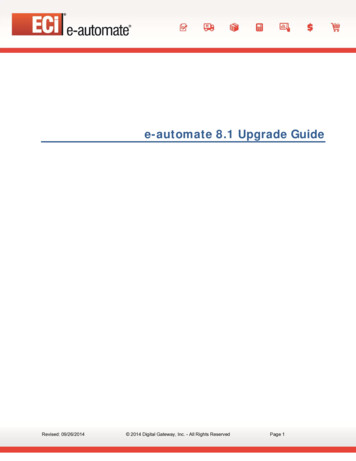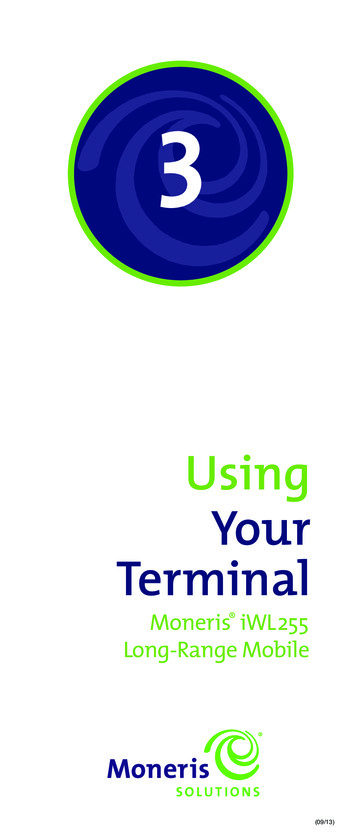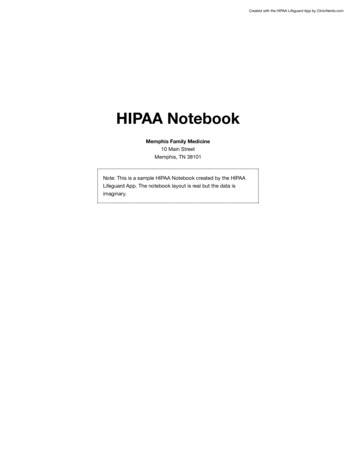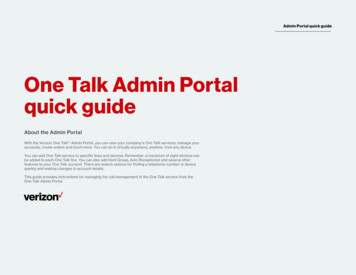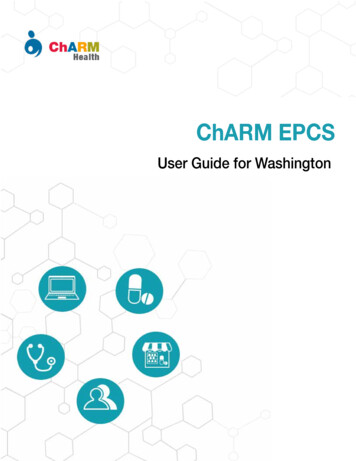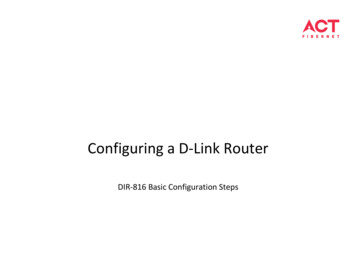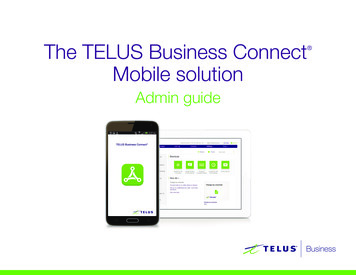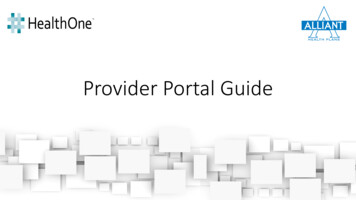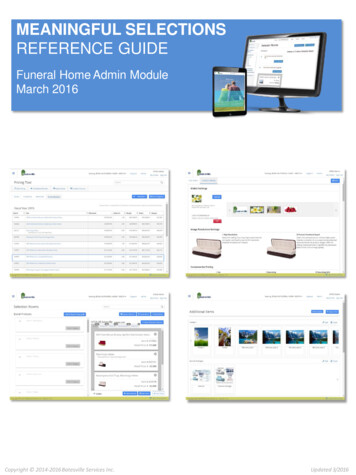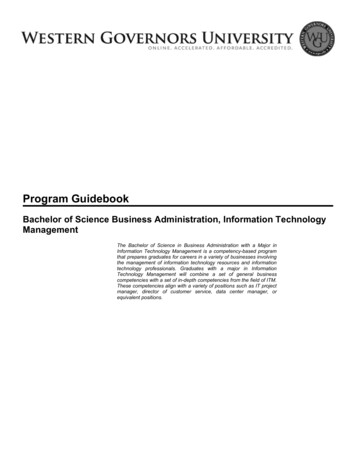
Transcription
Program GuidebookBachelor of Science Business Administration, Information TechnologyManagementThe Bachelor of Science in Business Administration with a Major inInformation Technology Management is a competency-based programthat prepares graduates for careers in a variety of businesses involvingthe management of information technology resources and informationtechnology professionals. Graduates with a major in InformationTechnology Management will combine a set of general businesscompetencies with a set of in-depth competencies from the field of ITM.These competencies align with a variety of positions such as IT projectmanager, director of customer service, data center manager, orequivalent positions.
Understanding the Competency-Based ApproachPractically speaking, how do competency-based programs like those offered at Western GovernorsUniversity (WGU) work? Unlike traditional universities, WGU does not award degrees based oncompletion of a certain number of credit hours or a certain set of required courses. Instead, you will earnyour degree by demonstrating your skills, knowledge, and understanding of important concepts.Progress through a degree program is governed not by the amount of time you spend in class but by yourability to demonstrate mastery of competencies as you complete required courses. Of course, you willneed to engage in learning experiences as you review competencies or develop knowledge and skills inareas in which you may be weak. To help you acquire the knowledge and skills you need to completeyour courses and program, WGU provides a rich array of learning resources. Your program mentor willwork closely with you to help you understand the competencies required for your program and to help youcreate a schedule for completing your courses. You will also work closely with course instructors as youengage in each of your courses. As subject matter experts, course instructors will guide you through thecontent you must master to pass the course assessments.The benefit of this competency-based system is that it enables students who are knowledgeable about aparticular subject to make accelerated progress toward completing a degree, even if they lack collegeexperience. You may have gained skills and knowledge of a subject while on the job, accumulatedwisdom through years of life experience, or already taken a course on a particular subject. WGU willaward your degree based on the skills and knowledge that you possess and can demonstrate—not thenumber of credits hours on your transcript.AccreditationWestern Governors University is the only university in the history of American higher education to haveearned accreditation from four regional accrediting commissions. WGU's accreditation was awarded by(1) the Northwest Commission on Colleges and Universities, (2) the Higher Learning Commission of theNorth Central Association of Colleges and Schools, (3) the Accrediting Commission for Community andJunior Colleges of the Western Association of Schools and Colleges, and (4) the Accrediting Commissionfor Senior Colleges and Universities of the Western Association of Schools and Colleges. The university’saccreditation status is now managed by the Northwest Commission on Colleges and Universities(NWCCU), which reaffirmed WGU’s accreditation in February 2020. The WGU Teachers College isaccredited at the initial-licensure level by the Council for the Accreditation of Educator Preparation(CAEP) and by the Association for Advancing Quality in Educator Preparation (AAQEP). The nursingprograms are accredited by the Commission on Collegiate Nursing Education (CCNE). The HealthInformation Management program is accredited by the Commission on Accreditation for HealthInformatics and Information Management Education (CAHIIM). The College of Business programs areaccredited by the Accreditation Council for Business Schools and Programs (ACBSP).The Degree PlanThe focus of your program is your personalized Degree Plan. The Degree Plan is a detailed blueprint ofthe courses you will need to complete in order to earn your degree. The Degree Plan also lays out theaccompanying learning resources and assessments that compose your program. The list of courses inthe Degree Plan is often referred to as the standard path. The amount of time it takes to complete yourprogram depends on both the amount of new information you need to learn and the amount of time youplan to devote each week to study. Your program mentor and course instructors will help you assess yourstrengths and development needs to establish a study plan.Students vary widely in the specific skills and information they need to learn. For example, some studentsmay be highly knowledgeable in a particular subject matter and would not need to engage in new learningopportunities. Other students may find that portions of the program require them to learn new informationand that they need to take an online class or participate in a study module to acquire the knowledge andskills needed to fulfill program competencies in that area. Some individuals may be able to devote as littleBSBAIT 202203 2019 Western Governors University 12/20/212
as 15–20 hours per week to the program, while others may need to devote more time. For this reason,pre-assessments are there to help your program mentor form a profile of your prior knowledge and createa personalized Degree Plan.How You Will Interact with FacultyAt WGU, faculty serve in specialized roles, and they will work with you individually to provide theguidance, instruction, and support you will need to succeed and graduate. As a student, it is important foryou to take advantage of this support. It is key to your progress and ultimate success. Upon yourenrollment, you will be assigned a program mentor—an expert in your field of study who will provide youwith regular program-level guidance and support from the day you start until the day you graduate. Yourprogram mentor will set up regular telephone appointments (weekly at first) with you, which you will beexpected to keep. The mentor will review program competencies with you and work with you to develop aplan and schedule for your coursework. Your program mentor will serve as your main point of contactthroughout your program—helping you set weekly study goals, recommending specific learning materials,telling you what to expect in courses, and keeping you motivated. In addition to regular calls, yourprogram mentor is available to help you resolve questions and concerns as they arise.You will also be assigned to a course instructor for each course. Course instructors are doctoral-levelsubject matter experts who will assist your learning in each individual course. When you begin a newcourse, your assigned course instructor will actively monitor your progress and will be in touch to offerone-on-one instruction and to provide you with information about webinars, cohort sessions, and otherlearning opportunities available to help you acquire the competencies you need to master the course.Your course instructor can discuss your learning for the course, help you find answers to contentquestions, and give you the tools to navigate the course successfully. In addition, you will communicatewith course instructors by posting in the online learning community and participating in live discussionsessions such as webinars and cohorts.For many of the courses at WGU, you will be required to complete performance assessments. Theseinclude reports, papers, presentations, and projects that let you demonstrate your mastery of the requiredcompetencies. A separate group of faculty members, called evaluators, will review your work todetermine whether it meets requirements. Evaluators are also subject matter experts in their field ofevaluation. If your assessment needs further work before it “passes,” these evaluators, who review yourwork anonymously, will provide you with instructional feedback to help you meet evaluation standardsand allow you to advance.Connecting with Other Mentors and Fellow StudentsAs you proceed through your Degree Plan, you will have direct contact with multiple faculty members.These communications can take a variety of forms, including participation in one-on-one discussions,chats in the learning communities, and live cohort and webinar opportunities. As a WGU student, you willhave access to your own personal MyWGU Student Portal, which will provide a gateway to your coursesof study, learning resources, and learning communities where you will interact with faculty and otherstudents.The learning resources in each course are specifically designed to support you as you developcompetencies in preparation for your assessments. These learning resources may include readingmaterials, videos, tutorials, cohort opportunities, community discussions, and live discussions that areguided by course instructors who are experts in their field. You will access your program communityduring your orientation course to network with peers who are enrolled in your program and to receivecontinued support through professional enrichment and program-specific chats, blogs, and discussions.WGU also provides Student Services associates to help you and your program mentor solve any specialproblems that may arise.OrientationBSBAIT 202203 2019 Western Governors University 12/20/213
The WGU orientation course focuses on acquainting you with WGU’s competency-based model, distanceeducation, technology, and other resources and tools available for students. You will also utilize WGUprogram and course communities, participate in activities, and get to know other students at WGU. Theorientation course must be completed before you can start your first term at WGU.Transferability of Prior College CourseworkBecause WGU is a competency-based institution, it does not award degrees based on credits but ratheron demonstration of competency. However, if you have completed college coursework at anotheraccredited institution, or if you have completed industry certifications, you may have your transcripts andcertifications evaluated to determine if you are eligible to receive some transfer credit. The guidelines fordetermining what credits will be granted varies based on the degree program. Students entering graduateprograms must have their undergraduate degree verified before being admitted to WGU. To review moreinformation in regards to transfer guidelines based on the different degree programs, you may visit theStudent Handbook found at the link below and search for “Transfer Credit Evaluation.”Click here for the Student HandbookWGU does not waive any requirements based on a student's professional experience and does notperform a "résumé review" or "portfolio review" that will automatically waive any degree requirements.Degree requirements and transferability rules are subject to change in order to keep the degree contentrelevant and current.Remember, WGU's competency-based approach lets you take advantage of your knowledge and skills,regardless of how you obtained them. Even when you do not directly receive credit, the knowledge youpossess may help you accelerate the time it takes to complete your degree program.Continuous Enrollment, On Time Progress, and Satisfactory AcademicProgressWGU is a “continuous enrollment” institution, which means you will be automatically enrolled in each ofyour new terms while you are at WGU. Each term is six months long. Longer terms and continuousenrollment allow you to focus on your studies without the hassle of unnatural breaks between terms thatyou would experience at a more traditional university. At the end of every six-month term, you and yourprogram mentor will review the progress you have made and revise your Degree Plan for your next sixmonth term.WGU requires that students make measurable progress toward the completion of their degree programsevery term. We call this “On-Time Progress,” denoting that you are on track and making progress towardon-time graduation. As full-time students, graduate students must enroll in at least 8 competency unitseach term, and undergraduate students must enroll in at least 12 competency units each term.Completing at least these minimum enrollments is essential to On-Time Progress and serves as abaseline from which you may accelerate your program. We measure your progress based onthe coursesyou are able to pass, not on your accumulation of credit hours or course grades. Every time you pass acourse, you are demonstrating that you have mastered skills and knowledge in your degree program. Forcomparison to traditional grading systems, passing a course means you have demonstrated competencyequivalent to a “B” grade or better.WGU assigns competency units to each course in order to track your progress through the program. Acompetency unit is equivalent to one semester credit of learning. Some courses may be assigned 3competency units while others may be as large as 12 competency units.Satisfactory Academic Progress (SAP) is particularly important to students on financial aid because youmust achieve SAP in order to maintain eligibility for financial aid. We will measure your SAP quantitativelyby reviewing the number of competency units you have completed each term. In order to remain in goodBSBAIT 202203 2019 Western Governors University 12/20/214
academic standing, you must complete at least 66.67% of the units you attempt over the length of yourprogram—including any courses you add to your term to accelerate your progress. Additionally, duringyour first term at WGU you must pass at least 3 competency units in order to remain eligible for financialaid. We know that SAP is complex, so please contact a financial aid counselor should you have additionalquestions. *Please note: The Endorsement Preparation Program in Educational Leadership is not eligiblefor federal financial aid.CoursesYour Degree Plan includes courses needed to complete your program. To obtain your degree, you will berequired to demonstrate your skills and knowledge by completing the assessment(s) for each course. Ingeneral there are two types of assessments: performance assessments and objective assessments.Performance assessments contain, in most cases, multiple scored tasks such as projects, essays, andresearch papers. Objective assessments include multiple-choice items, multiple-selection items,matching, short answer, drag-and-drop, and point-and-click item types, as well as case study and videobased items. Certifications verified through third parties may also be included in your program. Moredetailed information about each assessment is provided in each course of study.Learning ResourcesWGU works with many different educational partners, including enterprises, publishers, trainingcompanies, and higher educational institutions, to provide high-quality and effective learning resourcesthat match the competencies you are developing. These vary in type, and may be combined to create thebest learning experience for your course. A learning resource can be an e-textbook, online module, studyguide, simulation, virtual lab, tutorial, or a combination of these. The cost of most learning resources areincluded in your tuition and Learning Resource Fee. They can be accessed or enrolled for through yourcourses. Some degree-specific resources are not covered by your tuition, and you will need to coverthose costs separately. WGU also provides a robust library to help you obtain additional learningresources, as needed.Mobile Compatibility:The following article provides additional details about the current state of mobile compatibility for learningresources at WGU. It includes a list that can be referenced to determine the mobile friendliness of all corecourse materials used in a program.Student Handbook article: Can I use my mobile device for learning resources?Standard PathAs previously mentioned, competency units (CUs) have been assigned to each course in order tomeasure your academic progress. If you are an undergraduate student, you will be expected to enroll in aminimum of 12 competency units each term. Graduate students are expected to enroll in a minimum of 8competency units each term. A standard plan for a student for this program who entered WGU withoutany transfer units would look similar to the one on the following page. Your personal progress can befaster, but your pace will be determined by the extent of your transfer units, your time commitment, andyour determination to proceed at a faster rate.BSBAIT 202203 2019 Western Governors University 12/20/215
Standard Path for Bachelor of Science Business Administration, InformationTechnology ManagementCourse DescriptionCUsTermOrganizational Behavior31Fundamentals for Success in Business31Information Technology Management Essentials31Critical Thinking and Logic31Principles of Management42Business Environment Applications I: Business Structures and Legal Environment22English Composition I32Operations and Supply Chain Management32Project Management33Principles of Financial and Managerial Accounting33Emotional and Cultural Intelligence33Survey of United States History33Information Systems Management34Introduction to Communication34English Composition II34Integrated Physical Sciences34Introduction to Sociology35Applied Probability and Statistics35Principles of Economics35Business of IT - Applications45Introduction to Spreadsheets16Business Environment Applications II: Process, Logistics, and Operations26Finance Skills for Managers36Network and Security - Foundations36Applied Algebra36Introduction to Humanities37Concepts in Marketing, Sales, and Customer Contact37Managing in a Global Business Environment37Change Management37Introduction to Human Resource Management38Innovative and Strategic Thinking38Values-Based Leadership38Data Management - Foundations38Workforce Planning: Recruitment and Selection39BSBAIT 202203 2019 Western Governors University 12/20/216
Course DescriptionCUsTermBusiness Simulation49Compensation and Benefits39Employment Law39Quantitative Analysis For Business310Business - IT Management Portfolio Requirement310Business - IT Management Capstone Project410Changes to CurriculumWGU publishes an Institutional Catalog, which describes the academic requirements of each degreeprogram. Although students are required to complete the program version current at the time of theirenrollment, WGU may modify requirements and course offerings within that version of the program tomaintain the currency and relevance of WGU’s competencies and programs. When programrequirements are updated, students readmitting after withdrawal from the university will be expected tore-enter into the most current catalog version of the program.BSBAIT 202203 2019 Western Governors University 12/20/217
Areas of Study for Bachelor of Science Business Administration,Information Technology ManagementThe following section includes the areas of study in the program, with their associated courses. Yourspecific learning resources and level of instructional support will vary based on the individualcompetencies you bring to the program and your confidence in developing the knowledge, skills, andabilities required in each area of the degree. The Degree Plan and learning resources are dynamic, soyou need to review your Degree Plan and seek the advice of your mentor regarding the resources beforeyou purchase them.Business ManagementOrganizational BehaviorOrganizational Behavior explores how to lead and manage effectively in diverse business environments. The courserequires students to demonstrate the ability to apply organizational leadership theories and management strategies in aseries of scenario-based problems.This course covers the following competencies: Begin your course by discussing your course planning tool report with your instructor and creating your personalizedcourse plan together. The graduate can describe the effects of specified influences on individual behavior. The graduate can recommend appropriate principles or techniques for guiding the development of a group. The graduate can determine which type of team and team leadership should be used to accomplish a task or project. The graduate analyzes the culture within an organization to determine how to work effectively within that organization. The graduate can analyze leadership theories, methods, and tools in given situations and select the appropriatebehavior of the leader. The graduate can develop and recommend how to implement effective performance evaluation processes.Operations and Supply Chain ManagementOperations and Supply Chain Management provides a streamlined introduction to how organizations efficiently producegoods and services, determine supply chain management strategies, and measure performance. Emphasis is placed onintegrative topics essential for managers in all disciplines, such as supply chain management, product development, andcapacity planning. This course will guide students in analyzing processes, managing quality for both services and products,and measuring performance while creating value along the supply chain in a global environment. Topics include forecasting,product and service design, process design and location analysis, capacity planning, management of quality and qualitycontrol, inventory management, scheduling, supply chain management, and performance measurement.This course covers the following competencies: Begin your course by discussing your course planning tool report with your instructor and creating your personalizedcourse plan together. The graduate explains appropriate quality management strategies for continuous improvement in an organization. The graduate analyzes factors involved in the decision making for process design, capacity planning, and locationanalysis. The graduate analyzes forecasting models, measurement techniques, and scheduling methods. The graduate analyzes how just-in-time, TPS, and lean systems improve operating efficiency. The graduate analyzes the supply chain for competitive advantage. The graduate explains how a business achieves organizational goals and competitive advantage through operationsmanagement and inventory management.Project ManagementProject Management prepares students to manage projects from start to finish within any organizational structure. Thecourse presents a view into different project management methods and delves into topics such as project profiling andphases, constraints, building the project team, scheduling, and risk. This course helps students grasp the full scope of futureBSBAIT 202203 2019 Western Governors University 12/20/218
projects and apply the proper management approaches to complete a project. This course features practice in each of theproject phases as students learn to strategically apply project management tools and techniques to help organizationsachieve their goals.This course covers the following competencies: Begin your course by discussing your course planning tool report with your instructor and creating your personalizedcourse plan together. The graduate explains how project management helps organizations achieve their goals. The graduate describes the project life cycle, including how project constraints will impact a project. The graduate explains the criteria and methods used for project selection. The graduate explains how different types of project-management methods are used. The graduate applies elements of project planning to prepare key documents of a project plan. The graduate constructs a project scheduling network diagram including the identification of the critical path. The graduate explains key activities for executing, monitoring and controlling, and closing projects.Change ManagementChange Management provides an understanding of change and an overview of successfully managing change usingvarious methods and tools. Emphasizing change theories and various best practices, this course covers how to recognizeand implement change using an array of other effective strategies, including those related to innovation and leadership.Other topics include approaches to change, diagnosing and planning for change, implementing change, and sustainingchange.This course covers the following competencies: Begin your course by discussing your course planning tool report with your instructor and creating your personalizedcourse plan together. The graduate summarizes the theories related to change management. The graduate explains how organizations diagnose the need for change and the approaches for implementing change. The graduate describes different innovation strategies and the role leaders play in innovation. The graduate explains the various approaches to implementing change and the roles that leaders and otherstakeholders fulfill. The graduate explains the strategies, principles, roles, and models for sustaining change. The graduate explains how learning organizations develop and how learning organizations and traditionalorganizations approach change differently.Values-Based LeadershipValues-Based Leadership guides students to learn by reflection, design, and scenario planning. Through a combination oftheory, reflection, value alignment, and practice, the course helps students examine and understand values-basedleadership and explore foundations in creating a culture of care. In this course, students are given the opportunity to identifyand define their personal values through an assessment and reflection process. Students then evaluate business cases topractice mapping the influence of values on their own leadership. In this course, students also participate in scenarioplanning, where they can practice implementing their values in their daily routine (i.e., behaviors) and then in a leadershipsetting. The course illustrates how values-driven leadership is used in goal setting as well as problem-solving at anorganizational level. There are no prerequisites for this course.This course covers the following competencies: Begin your course by discussing your course planning tool report with your instructor and creating your personalizedcourse plan together. The learner identifies their personal values, including honesty, integrity, respect, emotional intelligence, and ethicalresponsibility, to develop self-awareness through self-assessment. The learner describes how interpersonal skills are applied to effectively collaborate, communicate, and lead within ateam and across an organization. The learner demonstrates how their leadership abilities, including active listening, influence, and ethical responsibility,solve problems and deliver results within an organization.BSBAIT 202203 2019 Western Governors University 12/20/219
The learner explains how the leadership of cultures fosters diversity, inclusion, ethics, and problem-solving.Quantitative Analysis For BusinessQuantitative Analysis for Business explores various decision-making models, including expected value models, linearprogramming models, and inventory models. This course helps student learn to analyze data by using a variety of analytictools and techniques to make better business decisions. In addition, it covers developing project schedules using the CriticalPath Method. Other topics include calculating and evaluating formulas, measures of uncertainty, crash costs, and visualrepresentation of decision-making models using electronic spreadsheets and graphs. This course has no prerequisites.This course covers the following competencies: Begin your course by discussing your course planning tool report with your instructor and creating your personalizedcourse plan together. The graduate describes common business analytical purposes for quantitative analysis methods. The graduate analyzes data through numerical and graphical methods and techniques. The graduate uses expected value methods as a decision-making tool. The graduate analyzes projects using the critical path to schedule and control project costs. The graduate uses linear programming, inventory economic ordering optimization models, and graphicalrepresentations to make informed decisions.Business CoreFundamentals for Success in BusinessThis introductory course provides students with an overview of the field of business and a basic understanding of howmanagement, organizational structure, communication, and leadership styles affect the business environment. It alsointroduces them to some of the power skills that help make successful business professionals, including time management,problem solving, emotional intelligence and innovation; while also teaching them the importance of ethics. This course givesstudents an opportunity to begin to explore their own strengths and passions in relation to the field while also acclimatingthem to the online competency-based environment.This course covers the following competencies: Begin your course by discussing your course planning tool report with your instructor and creating your personalizedcourse plan together. The graduate identifies common ethical issues that individuals face within organizations. The graduate recognizes common organizational functions and values in order to collaborate within them. The graduate communicates ideas, opinions, and information suitable for a professional setting. The graduate recognizes the emotional reactions of self and others in a variety of professional situations. The graduate identifies leadership opportunities to enhance organizational performance.Information Technology Management EssentialsInformation Technology Management Essentials includes topics such as information systems analysis, database resourcemanagement, spreadsheet literacy, and computer literacy concepts. This course will help students understand theimportance of information technology in an organization and apply databases to solve business problems. This courseserves as a p
(CAEP) and by the Association for Advancing Quality in Educator Preparation (AAQEP). The nursing programs are accredited by the Commission on Collegiate Nursing Education (CCNE). The Health Information Management program is accredited by the Commission on Accreditation for Health Informatics and Information Management Education (CAHIIM).
